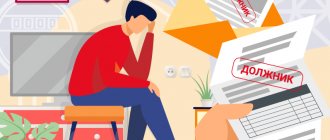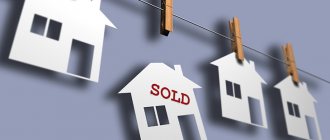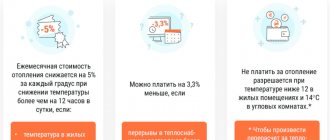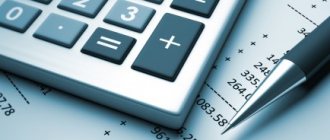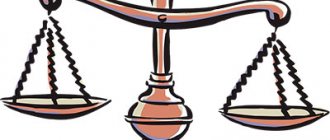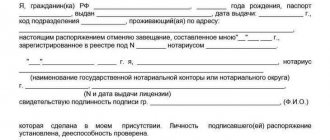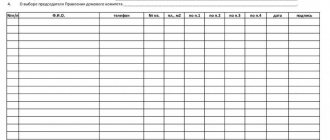In accordance with current legislation, the owner of the premises is obliged to pay for all services on time and in full. But in practice, it may happen that several people can be the owners of the same premises. If one of them does not pay for services, then a debt arises. In this regard, it would be reasonable to ask how the debt for utility bills is divided?
Possible solutions to the issue
It is immediately necessary to say that the situation can be resolved by resorting to one of the possible methods:
- Independent resolution of the current controversial situation by finding a compromise between the residents living together.
- Applying to the Management Company with a request to divide the personal account into parts, in proportion to the shares of ownership of the property.
- The last, and extremely unpleasant option is to initiate litigation.
Of course, the method of solving the problem in court is the most effective, but when the question arises of how the debt for utility bills is divided, it is at the same time the most time-consuming and significant in terms of financial costs. Of course, the easiest way is to reach an agreement peacefully.
How to repay if you have nothing to pay?
Expert opinion
Stanislav Evseev
Lawyer. Experience 12 years. Specialization: civil, family, inheritance law.
In accordance with Art. 153 of the Housing Code of the Russian Federation, the obligation to pay utility bills rests with the owner of the residential premises. He is obliged to make regular payments in accordance with the agreement with the management company, HOA or directly with the service provider.
Payment for heating is calculated regardless of whether anyone lives in the apartment or not. Other utilities (electricity, gas, water supply, sewerage) are paid in accordance with meter readings.
If the house cannot be equipped with meters, then payment is calculated according to the standards. If the owner does not live in the apartment, he can provide a certificate about this to receive a recalculation.
Thus, utility bills can be charged even if no one lives in the apartment. Therefore, the owner is obliged to constantly make payments.
If funds are not paid on time, a debt is formed.
Important! It is advisable to prevent the formation of debt. If the amount of rent is prohibitively high for the family budget, it is necessary to take care in advance of obtaining assistance from the state to pay for them.
Only owners who do not have payment debts at the time of appeal are entitled to assistance.
If the debt has already been accrued, then it is necessary to develop a repayment procedure.
In 2021, there are several ways to pay off utility debt.
| No. | Repayment methods |
| 1 | Debt restructuring |
| 2 | Government subsidy |
| 3 | Benefits for certain categories of citizens |
Turn out the lights
There are many ways to influence debtors, but their use is not always possible. The most effective, according to Yulia Kombarova, is to turn off the water. “But such restrictions are often carried out in violation of the law, since the qualifications of lawyers in the housing and communal services sector leave much to be desired,” she notes. Sometimes debt collectors are hired to deter defaulters. Since the summer of 2019, they have been deprived of the right to buy citizens’ debts for utility bills, but the ban can be circumvented - collectors work under contracts without assigning claims, receiving a percentage of the money claimed.
As for turning off water and electricity, this measure was proposed to be completely eliminated in February 2020. The State Duma is considering the corresponding amendments to Article 157 of the Housing Code, and the legal department of the lower house has already given a positive opinion on them. According to deputy Alexei Kurinny, currently all residents of apartment buildings are suffering due to the shutdown of resources, even if they are not in debt. “After the closures, the sewer overflows into other apartments, which leads to terrible unsanitary conditions with all the ensuing consequences,” he said. The deputy also said that the heating should not be turned off, since families who cannot pay have to live in the cold.
Photo: Albert Zen / TASS
Alexey Volkov notes that entering data on debts into citizens’ credit histories works effectively. “As practice shows, about half of all persistent defaulters fully or partially repay their existing debt as soon as possible after they learn that this information has entered their credit histories,” says the expert. “This is largely due to the fact that the transfer of data on debts for housing and communal services to the NBKI does not allow these citizens to apply in the future for credit resources from banks, microfinance organizations, pawnshops and other creditors.”
Auditor Oleg Shalagin has developed a whole plan to increase the level of payment discipline in the housing and communal services sector. He proposes, in particular, to send out notices to consumers about the need to pay for services, to place information stands with the addresses of debtors in the offices of management companies, to publish materials on measures of influence on defaulters in the media and on the same stands, to actively collect debts through the court, and to organize mobile notification groups citizens about the presence of debt.
About half of all persistent defaulters pay off their existing debt in full or in part as soon as possible after learning that this information was included in their credit histories
Alexey VolkovMarketing Director of the National Credit History Bureau
“A good way to influence the situation would be direct contact of the management company with residents - it is necessary to hold meetings and meetings at which to tell residents in detail what the tariff consists of,” believes Andrei Khokhlushin. - We practice this. Our general and financial directors of management companies meet with residents of neighborhoods and explain why prices are rising, what makes up the price of a particular service. And when people see transparency and clearly understand where their money is going, the limit of trust in management companies increases. And this is probably the most effective way to get increased fees from the right people. For the rest, there are courts.”
Court is long and expensive, so while utility companies are coming up with their own, “folk” ways to deal with defaulters: they place billboards with the names of debtors on highways, put up 300-kilogram “pyramids of shame” and even wooden toilets near their houses - to remind them who can be life without sewerage.
Government subsidy
Subsidies are possible for all categories of citizens. However, a prerequisite is that the monthly payment for utilities is more than 22% of the total family budget.
In practice, this option as a subsidy is suitable for single pensioners and low-income families.
A special feature of the subsidy is the need to pay utility bills in full. And the established amount is returned to the recipient’s account at the end of the month.
The amount of the subsidy is calculated for each family individually. Depending on the total family income, on the region of circulation. The subsidy amount can be from 5 to 30% of the total payment amount.
A prerequisite at the time of applying for a subsidy is the absence of utility debt. Therefore, if there is any amount of debt, the authorized body will refuse to assign a support measure.
The body authorized to assign subsidies for housing and communal services is the district social protection department. To apply, you must have permanent registration in the region of application. In addition, only the owner of the premises can receive assistance.
What utilities cannot be disconnected for debts in 2021?
For a certain amount of debt, the management company has the right to limit the debtor’s consumption of utility resources, with some exceptions. For example, residents of apartment buildings cannot be left without cold water and heating. This norm is enshrined in paragraph 119 of Government Resolution No. 354 dated May 6, 2011. This is due to the fact that such measures make the premises unsuitable for living (especially in winter). In addition, there is a great risk of causing damage to other home owners living in the same building as the debtor.
Is it possible to turn off electricity for utility debts?
Electricity (along with hot water, gas and sewerage) is included in the list of resources that the management company can turn off. If a consumer has not paid for electricity for more than two months and the amount of his debt exceeds two monthly payments calculated according to the standard, he may be forced to limit his consumption. After receiving the relevant notification, the debtor is given an additional 20-day period to pay the debt.
This procedure is prescribed by law, but in practice, utility services always meet their consumers halfway and are in no hurry to cut off a citizen’s access to energy resources. Even if the debtor has paid at least part of the money, this is already considered a reason not to disconnect him from the resource.
Privileges
Benefits for utility services in the Russian Federation are provided for certain categories of citizens. The exact list is established by regional regulations.
Important! Contact your district social protection department and check the list of beneficiaries. You may be eligible for a reduced monthly payment.
A special feature of benefits is the need to register them. They don't act unconditionally.
The beneficiary is required to come to the social protection department and receive a certificate of eligibility for benefits.
In most regions, the right to benefits is granted to the following categories of citizens:
- WWII veterans and combatants;
- labor veterans;
- large families;
- guardian families.
The certificate is issued within 15 days from the date of application. The document is submitted to the management company or HOA.
Important! Benefits begin to apply from the moment information is provided to the authorized body. The beneficiary does not receive the right to reduce previously formed debt.
A large debt has accumulated for utilities - where to start?
The first thing to do is find out the real amount of debt. The easiest and fastest way is to call the URC (Unified Settlement Center) or the management company/homeowners association and use your personal account number to clarify the amount of debt. If you are a confident Internet user, you can check the information on the website of the State Services, management company or HOA through your Personal Account. In addition, during reception hours, a citizen has the right to personally contact the utility service to receive face-to-face consultation.
Even if you received information about the debt remotely, you will still have to visit the office of the management company or HOA. The organization’s employees will help you correctly arrange the installment payment and indicate the deadline within which you need to deposit the funds. Even in the worst cases it is possible to reach an agreement. There are a number of measures to support citizens who find themselves in difficult financial situations - subsidies, benefits, utility holidays.
Legislation
The Housing Code of the Russian Federation defines utility payments as mandatory for owners and tenants of premises. Article 153 of the Housing Code of the Russian Federation requires citizens and organizations to pay fees for residential premises and utilities in a timely manner and in full.
List of mandatory payments
The list of items that are included in the housing fee structure is specified in Article 154 of the Housing Code of the Russian Federation.
It includes:
- payment for the maintenance of premises and management services of an apartment building;
- payment for current and major repairs of common property, cleaning of the local area;
- payment for utility resources (individual and general household consumption is taken into account): cold and hot water, electricity, heat, gas, solid fuel (if the heating is stove), sewerage and garbage removal.
In addition, at a general meeting of home owners, by a collective decision (upon reaching a certain majority of votes), this list can be expanded. At the request of residents, it includes security services, concierge or snow removal in winter. Even if the owner was not at such a meeting or does not agree with its outcome, he will have to submit to the opinion of the majority.
How to find out the amount of debt
Methods for clarifying debt can be divided into 2 groups:
- Remote (using means of communication);
- In-person (personal visit to the organization).
During the pandemic, since 2020, remote interaction has become a priority. Utility organizations have suspended in-person consultations. Under the current conditions, citizens who found themselves in “home mode” could find out the amount of debt only through online services or telephone calls.
Online resources that provide information about debts for housing and communal services include:
- State Services Portal;
- Website of the URC (Unified Settlement Center);
- Website of the management company or HOA.
To find out the data, you need to log in or register through your Personal Account. Next, find the section with the corresponding service and request information about your personal account balance. Since the State Services website is an all-Russian portal, the sequence of actions when working with it is the same for all residents of our country. The ERC website, on the contrary, is developed separately for each region, so there is no single algorithm for obtaining the necessary data. The same applies to online services of management companies and homeowners associations.
With the development of the mobile Internet, the most progressive management companies and homeowners associations have acquired applications that allow them to monitor the status of their personal account from the screen of their mobile phone. In fact, this is the same Personal Account from the company’s official website, but more adapted for mobile devices.
Another way to find out the debt without a personal visit is a phone call. You can call the numbers of the Unified Settlement Center indicated on the receipts, or the control room of the management company/chairman of the HOA.
When using remote means of obtaining information, no specific data will be required from you. It is enough to know the address or personal account number. When conducting payment transactions, reference to an address is required, since services are assigned to a specific premises, which is identified precisely by the address of its location. The personal account is registered in each receipt and is an individual number of an apartment or non-residential premises, under which all important information is stored - the owner’s full name, address, area and other parameters, payment data and the amount of debt.
For those who prefer personal communication, there is face-to-face reception at utility organizations. On specially designated days and hours, a citizen can physically visit the utility service and obtain the information he needs. In this case, you must take with you an identification document (passport), a certificate of ownership (an alternative option is registration) or a rental/lease agreement confirming the right to use the premises.
Don't be afraid to contact the management company
For many debtors, the fact of having a debt causes emotional discomfort. A feeling of fear and shame appears. Therefore, they try to delay the resolution of the situation until the last minute. There is no need to be afraid. The sooner you contact the management company, the better. People work there too. Depending on the severity of the case and the amount of debt, they will help you find a way out. Most often this is an installment plan for a predetermined period. In exceptional cases, the debtor may be provided with utility holidays or penalties may be written off.
Who does the apartment debt apply to?
The utility service has the right to collect debt from all citizens directly related to this residential premises. Among them:
- The owner and his family members. In accordance with Article 31 of the Housing Code of the Russian Federation, along with the owner, capable members of his family living with him are responsible for timely payment for residential premises and utilities. This is a spouse, children, parents. In exceptional cases, other relatives may also be recognized as family members if they were moved into the residential premises by the owner in that capacity.
- Persons who have the right of shared ownership of this premises. At the same time, personal accounts can also be divided so that you can legally pay only your part of the debt.
- Tenant under a social tenancy agreement and members of his family. By analogy with the owner, all capable family members of the tenant are jointly and severally liable.
- The heir or other relatives of the deceased owner registered with him in this premises.
The law prohibits the collection of debt from a minor, even if he is registered in the debtor’s apartment. Parents or guardians must do this for him, also within the framework of joint and several liability.
Installment of debt
If the debt has already been formed, then it is possible to contact a management company to restructure it. This is the name for processing debt in installments under an agreement between the management company and the debtor.
To do this, the debtor must submit an application for installment payment for utility bills. The document is drawn up in writing.
From the moment the agreement is signed, the citizen is obliged not only to make monthly current payments, but also to additionally pay part of the accumulated debt. Thus, the amount of debt decreases monthly.
From the moment the agreement is concluded, penalties and fines cannot be accrued on the amount of the debt. The amount is fixed.
An installment plan can be arranged not only pre-trial, but also after a court decision to forcibly collect the debt.
In such a situation, an agreement must be concluded not with the management company, but with the bailiffs.
In this case, interest is also not charged. The amount is fixed in the writ of execution. However, you will additionally have to pay the state fee to the court, which was paid by the plaintiff, and the fee for initiating enforcement proceedings.
Therefore, it is advisable to conclude an agreement before the authorized body goes to court.
To begin with, every person must understand that
Despite the current situation, no one will “forgive” accumulated utility debts. There are many advisers on the Internet who recommend not paying for three years, and then, supposedly, these debts will be written off. This is hardly sound advice. After all, in addition to the debt itself, a penalty will be charged for each day of delay.
If you do not pay for several months, the management company has the right to sue the defaulter from the second month of late payment. Today it is not even necessary to notify you; the court can send your case to bailiffs. And then the “interesting” part begins: your bank cards may be blocked; if there is a need to travel abroad, this will also be impossible due to a court order.
Well, the worst option is if the bailiffs seize your property for the purpose of further sale at auction, so that the money received goes to pay off the debt.
To prevent this from happening, you should not experiment, but rather look for timely ways to solve a difficult life situation. The main principle of paying for housing and communal services is to be sure to pay the main receipts (for late payments, your utility service may be turned off).
How not to pay legally?
The law establishes a number of utility services that must be paid. These are electricity, gas, water supply, sewerage and heating. Failure to pay will result in penalties and interest.
Let's consider whether it is possible not to pay a penalty. The accrual of penalties can only be challenged in court. The applicant must prove that the amounts were calculated incorrectly.
If the court takes into account the applicant’s evidence, the amount will be reduced or written off completely.
At the same time, a number of payments are established that cannot be increased due to penalties. In case of non-payment, the service provider simply stops providing the service until payment is made. Such services include an elevator, antenna, radio, intercom, Internet, home telephone.
Let's look at why you don't have to pay for some housing and communal services. Not all owners need certain services. If you do not need cable TV or the Internet, then you can simply stop making payments.
Partial payment
Many people have a question about how to pay for utilities partially, because there is only one receipt. If you simply donate an incomplete amount, it will be evenly distributed among all services. However, the law does not prohibit paying for services separately. You need to find a way to allow payment for a specific service.
For example, payment only for hot water supply. You must enter the exact amount charged for a specific service and indicate the purpose of the payment.
For example, in the receipt in the “hot water supply” column the amount of 659.70 rubles is indicated. You need to make a payment for this amount and indicate “payment for hot water supply”. If you cannot make such a payment in your personal account, you will have to do it at a bank branch with a cashier.
Be sure to check your receipt after payment to ensure everything is indicated correctly.
Debts for housing and communal services in the event of bankruptcy of an individual - what happens?
An individual (as well as a legal entity) can begin bankruptcy proceedings if he is unable to fulfill all of his debt obligations. A citizen’s right to bankruptcy and the procedure for action are prescribed in Chapter 10 of Federal Law No. 127-FZ of October 26, 2002. Most often it is used by those who have no property other than their only home. As soon as the court declares a person bankrupt, all debts that arose before the bankruptcy procedure began are written off from him, if his property is not enough to cover them (this also applies to utility debts). A significant drawback lies in the fact that for the procedure you need to pay a certain (rather large) amount of money.
On September 1, 2021, amendments to Chapter 10 of Federal Law dated October 26, 2002 No. 127-FZ came into force. Now the possibility of extrajudicial (simplified) bankruptcy on a free basis is being introduced for individuals. Thus, citizens will be able to write off debts in the amount of 50,000 to 500,000 rubles.
However, even a bankruptcy procedure will not save a citizen from paying current utility bills.
Why you should entrust debt collection to lawyers
Fewer conflict situations . The Codex lawyer communicates with debtors instead of the HOA chairman. As a result, the negative reaction of defaulters is not directed at the board of the partnership - this helps maintain neutral relations after the trial.
Pre-trial settlement . For some housing and communal services defaulters, the lawyer has a “sobering” effect. As a result, they do not want to take the case to court and agree to pay off the debt.
Are you ready for counterclaims ? Debtors file claims against the HOA board, submit applications for debt recalculation and claims regarding illegal decisions of the general meeting. The goal is to delay the proceedings and gain time. We anticipate complaints and prepare responses in advance.
